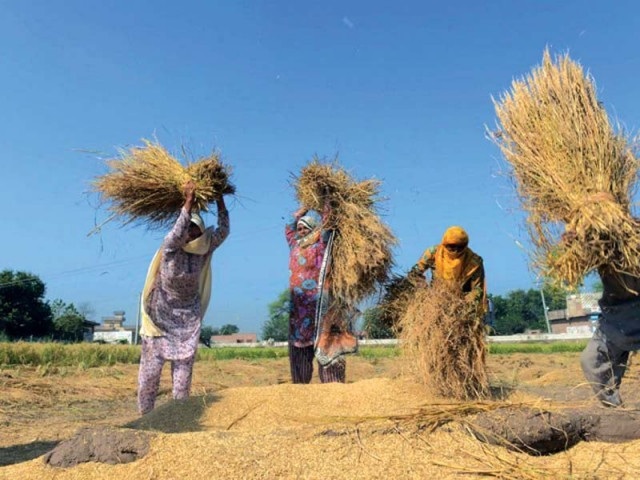International Day of Rural Women: The hidden power remains underutilised
SDGs remain a distant target

Labour of rural women is often unaccounted for. PHOTO: FILE
Rural women represent over 30 per cent of the population of Pakistan — the largest demographic group. Literacy rates, however, are worrying, as only 36 per cent of rural women are considered literate, according to the Economic Survey of Pakistan 2014, while 63 per cent of rural men are literate in the same document.

Women have a great role to play in achieving sustainable development goals, especially in a scenario where we have already missed the millennium development goals. The problem, however, is that women, especially those in rural settings, are unable to reach their full potential. Their troubles only increase due to patriarchal societal structures.
“Pakistani rural women suffer triple burden of unpaid productive, reproductive and domestic labour,” said human rights activist Tahira Abdullah. Their production labour is uncounted in GDP statistics, she added. Women farm workers are not registered as formal labourers and are thus ineligible for social security, workers’ welfare benefits, health, education and skills training opportunities, she said.
In a developing country like ours, rural women fail to secure their right to education and property. “Education of girls is a primary requirement for empowering both urban and rural women,” said former MNA Yasmeen Rehman. They will be much more aware of their rights if they are educated, she added.
If a woman is educated and financially independent, she can make much better decisions and contribute towards the well being of her family and the society as a whole. Women play a major role in running households in developing areas, but their vital contributions often go unnoticed and are generally undervalued. Rural women play a number of simultaneous roles in their daily routines, as farmers, as caregivers for their families, and sometimes as labourers in small industries. Despite this, they are continuously held back by inequality in terms of education opportunities, property rights and decision making.
Land ownership is mostly exclusive to male family members. While giving recommendations, Abdullah said, “CNICs for all women should be assured and a minimum of one acre of agricultural land should be in a woman’s name.” There should be joint ownership of all agricultural land, she suggested.
She further stressed registration of all agricultural and home-based workers to avail social security, workers welfare, health, education, skill trainings and other benefits, especially for women-headed households.
While stressing on long-term solutions, Rehman said there is a need for well-structured long term policy debates, leading to legislation and implementation, involving parliament, political parties, civil society, academia, media, and other stakeholders.
LB elections hold great significance in implementing development policies in the country, as women are not visible in mainstream politics, she said. Unless women have resources and power to contest general elections, reserved seats are the only way for them to be part of a legislative body. Reserved seats can be abolished once women gel in, she added.
There is a need to amplify the voices of rural women, and media can be used as a great tool for that. IIUI In-charge Department of Media and Communication Studies Quratul Ain Malik said content focusing on pertinent issues of rural women such as female child education, early marriages, and early and excessive child bearing should be shown to generate knowledge and create understanding. “Private media considers it the responsibility of state media to educate the masses, while it performs the entertainment function,” she said while criticising the role of the former. The media should reduce unfruitful discussions on political matters and turn towards issues which can make a difference in the life of a common man, she added
It is good to see UN and other civil society organisations celebrating women days, but there should be policy debates and follow ups of implementation of recommendations made on these days, said Rehman. Otherwise such activities will not bring any sustainable positive change in lives of common women, she added.
Published in The Express Tribune, October 15th, 2015.



















COMMENTS
Comments are moderated and generally will be posted if they are on-topic and not abusive.
For more information, please see our Comments FAQ